A Well Thought Out Scream By James Riordan: Cook County Jail Is Now the Largest Mental Health Facility in Illinois &The Nation
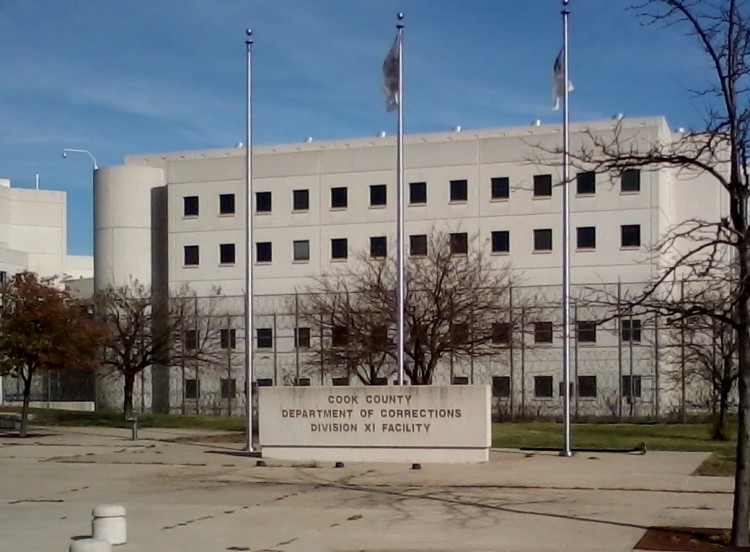
At Cook County Jail, an estimated one in three inmates has some form of mental illness. At least 400,000 inmates currently behind bars in the United States suffer from some type of mental illness—a population larger than the cities of Cleveland, New Orleans, or St. Louis—according to the National Alliance on Mental Illness. NAMI estimates that between 25 and 40 percent of all mentally ill Americans will be jailed or incarcerated at some point in their lives.
“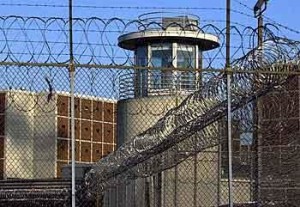 This is typically what I see everyday,” said Elli Petacque-Montgomery, a psychologist and the deputy director of mental health policy for the sheriff’s department. She displayed a medical intake form filled with blue pen scribbles. Small boxes listed possible illnesses: bipolar disorder, ADHD, schizophrenia, and so on. The forms are designed to help jail officials identify which inmates have mental illnesses as early as possible. Details from four new inmates could fit on a single sheet. She pointed to a completed form. “Of those four,” she said, pointing to the descriptors, “I have three mentally ill people.”
This is typically what I see everyday,” said Elli Petacque-Montgomery, a psychologist and the deputy director of mental health policy for the sheriff’s department. She displayed a medical intake form filled with blue pen scribbles. Small boxes listed possible illnesses: bipolar disorder, ADHD, schizophrenia, and so on. The forms are designed to help jail officials identify which inmates have mental illnesses as early as possible. Details from four new inmates could fit on a single sheet. She pointed to a completed form. “Of those four,” she said, pointing to the descriptors, “I have three mentally ill people.”
The Cook County jail may, on any given day, house 11,000 prisoners, and according to The New York Times, the number of them suffering from serious mental illnesses is about 2,000. If the jail were a hospital, this would translate to 2,000 beds. By contrast, the large, state-operated Elgin Mental Health Center has just 582 beds. The jail could now be considered the largest mental health provider in Illinois. Not only that but since Cook County Jail is the largest single-site jail in the United States and so many people with mental illness pass through the facility Cook County Jail can also be considered the largest mental-health facility in the nation
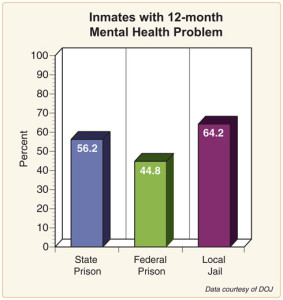 Cook County, however, is a jail with a cutting edge program developed by Cook County Sheriff Thomas Dart, a forward-thinking lawman tasked with the care of mentally ill prisoners. Into the prison environment, he brought doctors, psychologists and mental health professionals and then started an on-site training program for jail personnel. Dart explained that despite the efforts, the situation will almost certainly worsen. Half of the Chicago area’s 12 mental health centers were shuttered by the end of April, 2014 in a cost-cutting measure, and the likelihood of mental patients being left without treatment is high – and so is the likelihood of their doing something that will land them in jail.
Cook County, however, is a jail with a cutting edge program developed by Cook County Sheriff Thomas Dart, a forward-thinking lawman tasked with the care of mentally ill prisoners. Into the prison environment, he brought doctors, psychologists and mental health professionals and then started an on-site training program for jail personnel. Dart explained that despite the efforts, the situation will almost certainly worsen. Half of the Chicago area’s 12 mental health centers were shuttered by the end of April, 2014 in a cost-cutting measure, and the likelihood of mental patients being left without treatment is high – and so is the likelihood of their doing something that will land them in jail.
“It’s criminalizing mental illness,” said Dart, adding that the whole concept of treating mentally ill individuals in jails instead of healthcare facilities is not only senseless but also an incredibly expensive way to provide mental health treatment. But Dart has no alternative other than to accept bipolar, schizophrenic or even psychotic inmates when police arrest them.
“We’ve systematically shut down all the mental health facilities, so the mentally ill have nowhere else to go. We’ve become the de facto mental health hospital,” he said.
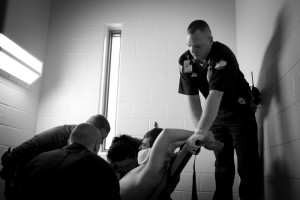
While the Cook County example may be dramatic, it is hardly unique. In fact, The New York Times quoted a study by the National Sheriffs’ Association and the Treatment Advocacy Center that reported that the number of mentally ill people in prisons and jails is three times that of those in hospitals.
NPR recently called Los Angeles County Jail, not only the largest jail system in the U.S. but also the largest de facto mental health facility in the country, but even that has now been surpassed by Cook County.
Sara Hough, PsyD., head of clinical psychiatry at the L.A. facility, told NPR that the hospital-in-a-prison opened in the late 1970s, just as mental hospitals began to close their doors. Now, it has too few beds to take care of patients with acute mental conditions.
“In many ways, we are a hospital,” said Hough. “What brought them into the system was an alleged crime, and we certainly at the Department of Mental Health are not here to judge that. But while they are here and they suffer from a mental illness, we will provide care.”
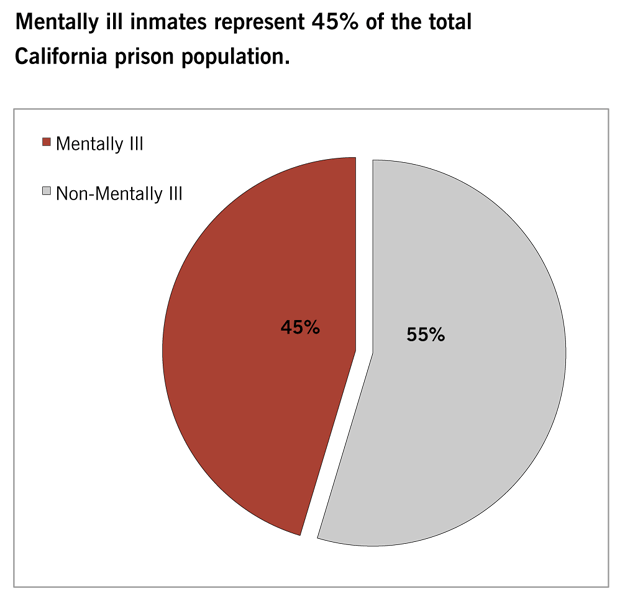 Psychology Today quoted Amanda Pustilnik, an associate professor of law at University of Maryland who has researched the relationship between law and mental health policy. In assessing the issue nationwide, she agreed that U.S. mental institutions currently serve as our largest jails.
Psychology Today quoted Amanda Pustilnik, an associate professor of law at University of Maryland who has researched the relationship between law and mental health policy. In assessing the issue nationwide, she agreed that U.S. mental institutions currently serve as our largest jails.
“According to the Department of Justice, nearly 1.3 million people with mental illness are incarcerated in state and federal jails and prisons – compared to only about 70,000 people being served in psychiatric hospitals,” she added.
NPR reported on an interview with Linda Teplin, professor of psychiatry at Northwestern University, who has focused on the issue for more than 30 years. Emphasizing that jails do not themselves make the choice to provide mental health treatment, Teplin nonetheless stated that jails have made a contribution of their own.
“Jails have been very good nationwide now about recognizing the need to screen for severe mental disorders when people come in, and also to provide treatment for people who are in their facility,” Teplin added.
As cities like Chicago and Los Angeles ramp up their mental healthcare, other parts of the country h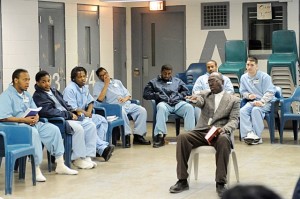 ave initiated training programs for law enforcement personnel. Some cities have created what NPR called “mental health courts” to help steer afflicted individuals away from jail and into treatment. Still, day centers, group homes and community centers suffer from the stigma long associated with mental disorders and the failure of communities to accept – let alone fund – the facilities.
ave initiated training programs for law enforcement personnel. Some cities have created what NPR called “mental health courts” to help steer afflicted individuals away from jail and into treatment. Still, day centers, group homes and community centers suffer from the stigma long associated with mental disorders and the failure of communities to accept – let alone fund – the facilities.
CBS News reported on the high proportion of mentally ill people in correctional facilities – an estimated 16 percent of U.S. prison and jail inmates are mentally ill, compared to only 5 percent of the general population – and also on the problems that have emerged, such as a high incidence of suicides. Possible solutions, said CBS, may come from congressman and women from “both sides of the aisle,” like Sen. Michael Lawlor (D-Conn.) and Sen.Thompson (R-Pa.) – but also from the criminal justice system. Miami-Dade Circuit Judge Steven Leifman summed up the challenge rather succinctly.
“Our justice resources need to be dedicated to violent criminals and homeland security, not to low-level offenders with mental illness who could be better served in treatment, at significant savings to taxpayers,” said Leifman.



No Comment